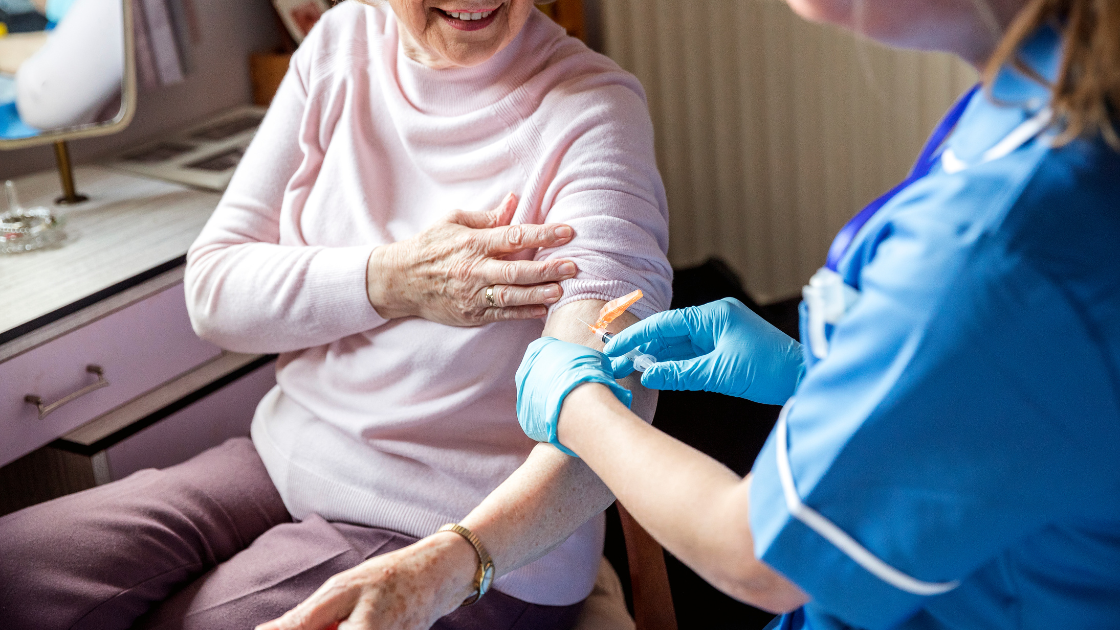With winter fast approaching, here is everything you need to know about the 2022-2023 National Flu Immunisation Programme. It’s well underway with many flu vaccinations already being administered across the country. Last year, almost five million people received their flu vaccinations in community pharmacies and this year we could see similar numbers but perhaps even more since COVID-19 may also play a bigger role during winter.
Why Are Flu Vaccinations Important?
Flu vaccinations are essential. While it may be unpleasant for most people, it can be dangerous and even life-threatening for more vulnerable groups.
For vulnerable people and those living with long-term conditions and multi-morbidity, it is important to provide them with the necessary protection. Many within these groups will already visit their community pharmacy on a regular basis and flu vaccinations can simply be provided as part of their usual care regime.
Another benefit of flu vaccinations is fewer work-related absences due to the flu, which can often result in loss of earnings. The best time to get a flu jab is in the autumn or early winter before the flu starts spreading. However, patients can get their flu vaccine later if necessary.
Who Is Eligible For Free NHS Vaccinations?
People aged between 50 and 64 can get free NHS flu vaccinations. In addition, anyone over the age of 18 whose health could be seriously affected by flu, due to an existing health condition, can also book a free NHS flu jab. Some of these serious health conditions include:
- Asthma (needing a steroid inhaler or tablets)
- Chronic obstructive pulmonary disease (COPD), including emphysema and bronchitis
- Diabetes
- Coronary heart disease or heart failure
- Overweight people with a body mass index (BMI) of 40 or higher
- Chronic kidney disease
- Liver diseases, such as hepatitis
- Parkinson’s disease, motor neurone disease, multiple sclerosis (MS), or cerebral palsy
- People with a learning disability
- Problems with your spleen like sickle cell disease, or if they’ve had their spleen removed
Other individuals who are eligible include those who are pregnant, patients and staff at long-term care facilities and anyone who is more likely to get a severe infection due to a weakened immune. This may be due to HIV and AIDS or taking medication such as steroid tablets or chemotherapy.

Flu Vaccines For Health And Social Care Workers
Those who work in the health or social care industry should get their flu vaccination through their employer as some may offer it as part of an occupational health scheme. However, if they can’t get it through their employer, they may still be able to get it if they work at a registered residential care or nursing home, a domiciliary care provider, a voluntary managed hospice provider or through direct payments or personal health budgets.
Frontline health and social care workers can book private or free NHS flu vaccinations at their registered GP surgery or a community pharmacy such as Chippenham Pharmacy & Health Clinic.
Who Should Avoid The Flu Vaccine?
Although the flu vaccine is generally safe for most adults, anyone who has had a serious allergic reaction to the flu shot in the past should avoid it. If they are allergic to eggs, they may also be at risk of an allergic reaction since some vaccines are made using eggs. In this case, they should ask their GP or pharmacists for a low-egg or egg-free vaccine.
People with certain medical conditions and a history of Guillain-Barré Syndrome should avoid getting the flu vaccine. Pregnant women and young children should also consult a healthcare provider before getting any flu vaccinations. If a patient has a high temperature, they should wait until they are better before getting their jab.
Does The Flu Vaccine Really Work?
Flu vaccinations offer the best form of protection against the main types of flu viruses but there is still a small chance you may still catch flu during the season. However, if you get sick after receiving the flu jab, the symptoms will likely be milder and they won’t last as long.
While an annual flu jab is the best way of protecting yourself, your family, friends and colleagues, it is also important to practice good hygiene. This includes washing your hands regularly and avoiding close contact with people who are sick.
Having a flu vaccine can also help stop you from spreading the flu to other people who could be more at risk of serious problems. It’s worth noting that it can take 10 to 14 days for the flu vaccine to be active.
Flu Vaccinations and COVID-19 Booster Shots
While flu can be especially dangerous for high-risk individuals, the potential severity of having COVID-19 and the flu means even those who consider themselves healthy still need protection. Remember, if patients are at a higher risk from coronavirus, they are also more at risk of problems from the flu.
It is also safe for eligible patients to receive a COVID-19 vaccine and a flu shot simultaneously as it won’t have any negative impact on the immune response. Contrary to earlier reports, flu vaccinations do not cause false positives when testing for Covid-19.
Where To Get Flu Vaccinations
While patients can visit their GP, community pharmacies offer flu vaccinations and some even without an appointment. However, it’s always good to call ahead and make sure the vaccine is in stock and that they can accommodate walk-ins.
Many pharmacies also have consulting rooms where trained healthcare professionals assist patients in a more private setting. Community pharmacies offer a fixed-point access to NHS services in the community and as a result, people trust and value their community pharmacists and their teams of healthcare professionals.
For more information about our wide selection of pharmacy training courses, including Leadership Training and our Health Champion Course, visit the website today! Alternatively, send us an email.

